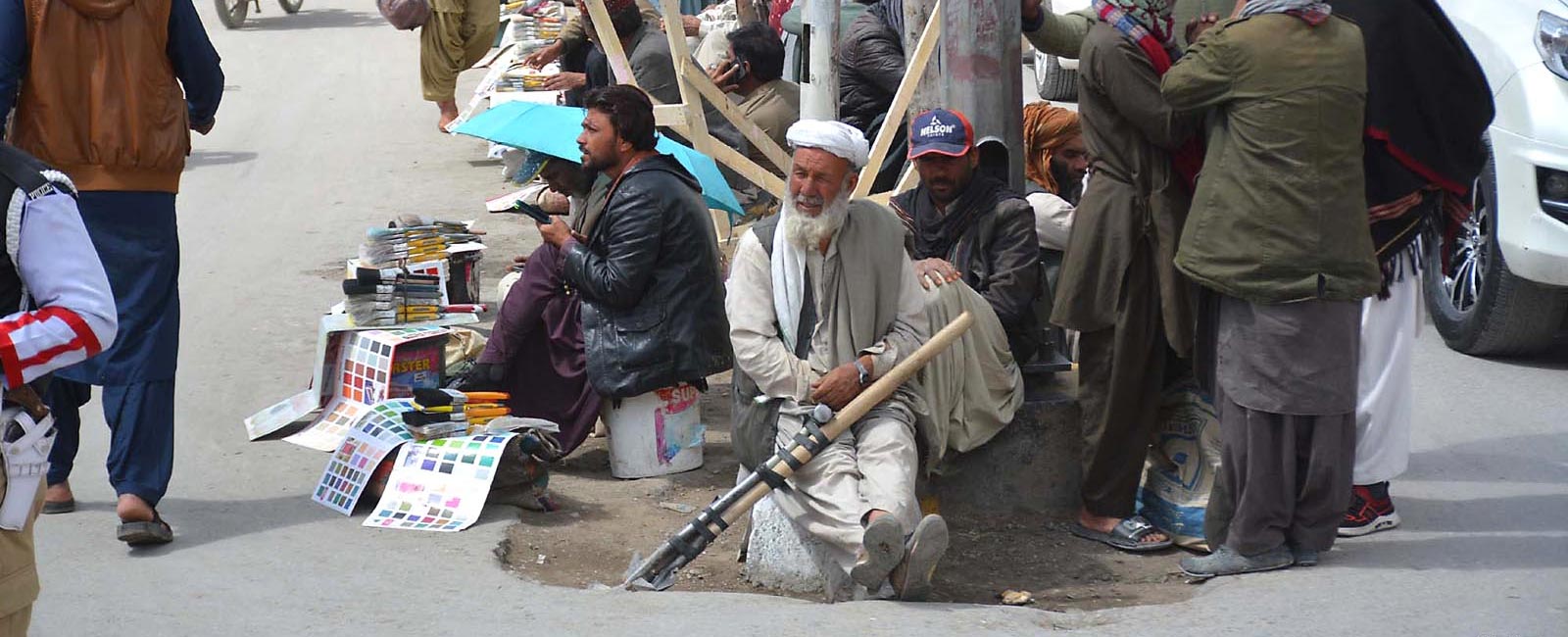Budgeting new life into dead low living wage
Laws pertaining to wage setting neither specify a formula nor stipulate any economic indicator to be used for this purpose

Thirty-eight-year-old Saira Feroz is a home-based worker from Karachi. A couple of years back, she used to earn Rs4,000 to Rs5,000 a month after putting in six hours each day in work on average. But as the inflation soared, her income dropped whereas her working hours increased. Because her employer cut down her wages on the pretext of keeping the business running under the current economic situation of the country.
“I and the likes of me have no other choice but to accept it, if we want to survive,” Feroz, who is the general secretary of Sindh United Home-Based Workers Union, said, explaining the power asymmetry and exploitation that persists in the work sector, be it formal or informal. “Despite we are skilled workers, we earn significantly less; a fourth of the current legally binding minimum wage which is Rs25,000. Not to mention, this is also insufficient.”
She belongs to the group of the lowest wage earners in the country. Women make up the majority, 61%, in this group. “We do the same work as our male colleagues, yet we are paid less and treated inferior to them,” she lamented, pinning her hopes on institutional measures that may help end gender discrimination and lessen wage disparity. “We have been fighting for long now. There is a law in place which entitles us to the minimum wage. Yet the implementation is zero.”
‘The rationale of minimum wage’
In his working paper “The rationale of minimum wage”, Berlin School of Economics and Law’s Prof Dr Hansjörg Herr opines that the labour markets are important for the stability of economies and leaving labour to the market mechanism and having flexible wages is “the worst thing that can happen”. Herr adds that this will lead to destabilisation of the price level and an explosion of inequality. He argues that minimum wages can play an important role to contain the destabilising potentials of labour markets.
Herr says that minimum wage increases compress the wage structure from below and lead to redistribution within wage earners and increases wage shares. He negates the notion that increasing minimum wages will lead to unemployment. Instead, he asserts that minimum wage policy can play an active role in the macroeconomic management of an economy and society.
The wage-setting process
Since 2010, the issue of labour has been devolved to the provinces. However, the federal government still exercises its power in this domain in the capital territory. There are two mechanisms to fix the minimum wage: through wage boards and collective bargaining agreements. The minimum wage covers all workers in industries and commercial establishments except public sector employees as they are the subjects of their respective employers.
Although workers in the informal economy are not excluded usually the minimum wage is applied in the formal sector only. Pakistan has a huge informal sector, comprising 56% of the total GDP, which employs the most vulnerable workforce.
Each province has their own wage boards. They are tripartite structures. Their permanent members include a chairman, who is a government official, and representatives from workers' and employers’ organisations. More members are inducted when deciding wages for skilled workers, but this doesn’t happen usually.
Therefore, the wages for skilled workers are decided by the market. The power to declare the minimum wage stays with the governments and they are not bound to follow the board’s recommendations or give any reason for their setting.
The laws pertaining to wage setting neither specify a formula nor stipulate any economic indicator to be used for this purpose. Also, the laws are silent on the purpose of a statutory minimum wage and there is no conceptual agreement among the stakeholders on this. Usually, the minimum wages are revised each year at the time of the budget announcement which takes place in June. Moreover, the government’s own data shows a pervasive underpayment of wages, which suggests that the minimum wage does not act as a binding floor wage.
No meeting for wage in Sindh
Home-Based Women Workers Federation’s general secretary Zehra Khan represents workers in the Sindh Minimum Wage Board. With a week left for the budget to be announced, she said the board has not convened any meeting on the matter. “Maybe, they will think of it after the budget,” Khan chuckled. “Actually, the government does not consult workers. They would only listen to the people with capital. This is how it works.”
She reiterated the fact that there is no mechanism in place to set the minimum wage and the process is all verbal. She suggested that the minimum wage should be set according to the Consumer Price Index and inflation rate, and it must cover the cost of living as well as leave some space for savings.
Minimum wages can play an important role to contain the destabilising potentials of labour markets
“In the current economic circumstances, a person needs to have at least Rs80,000 to cover their monthly household expenses. Punjab has announced the minimum wage to be at Rs32,000 whereas in Sindh it is speculated to be set at Rs44,000. Both of these figures are insufficient,” she said.
“An adequate minimum wage is very important. When a person or family is able to afford a square meal, transport and education, they are able to think about other social and political issues,” she said and added, “I think that not giving people their right to wage is a tactic of the ruling elite to keep them off from politics and other social matters.”
She said that since the pandemic, the size of the service sector in the informal economy has been increasing. “We need to adopt changes and devise our policies accordingly. But in the absence of data, it is not possible. And all the policies become futile,” she added.
She also questioned the veracity of the Labour Force Survey. She said that the survey appears to be assumption based. “I never witnessed any government authority collecting workers’ data. They just give a percentage increase to the labour force each year according to the size of the population. We need real data to make real changes.”
Living wage, not minimum wage
National Trade Union Federation’s general secretary Nasir Mansoor suggested renaming the minimum wage as the living wage and using a basket approach to fix this. The basket should cover the cost of food, education and health for an average household which includes one adult and two children. He referred to the Asia Floor Wage Alliance’s living wage estimate, which is Rs67,200 for Pakistan.
Mansoor said that the wages of workers in Pakistan have devalued by 70% in the past few years, because of the surge in the US dollar’s exchange rate. “Inflation has hit an all-time high. The social security net is non-existent, and everything is being privatised. This is sheer wage theft,” he exclaimed.
He said that the government was still using outdated mechanisms to deal with modern-day problems. “We need to use banking channels so that each transaction can be recorded. It is an excuse by the industrialists that the workers are reluctant to open bank accounts. They are trying to evade taxes and social security contributions.”
He added that the minimum wage was for unskilled workers, who make up around 5 to 6% of the total workforce. “The rest of the workforce is skilled, and their wages make are higher. There must be a scientific approach to deal with this matter.”
Syed Nazar Ali, Secretary General Employers Federation of Pakistan, said the rising inflation and high cost of living was not the only criterion for the fixation of minimum wage.
“You need to look into the economic conditions including requirements and environment of business/industrial development, comparative productivity, cost of doing business, employment situation, and above all the ability and the paying capacity of the industry,” said Ali.
He said the current economic crises including high inflation, tight policies and control of imports had resulted in massive unemployment due to the closure of industries, retrenchment etc. “An increase in the minimum wage should not be at the cost of employment,” he added.
Lobbies over labour
Economist Kaiser Bengali said that not having a formula in place for the minimum wage was politically convenient for the rulers. “It is not extended to the informal sector and de-facto not implemented in the formal sector. This is not something that can be addressed by a policy measure. However, trade unions can ensure implementation of this at the shop floor level.”
To fix the situation, he gave the example of the US where banking channels are used for payments. “Each employee needs a social security number; without which they can’t even find a job. We have a cash-based economy and keeping a check on that is impossible. We need to make social security numbers for each worker mandatory.”
He added, “In Pakistan, policies are being made for certain lobbies. Tariff policies for industrialists, tax policies for agriculturalists and the most favourite in current times is real estate. To make the situation of common people better, the state needs to decide who it represents.”
The writer is an interactive media journalist, specialises in labor policies and globalization. He is currently pursuing a degree at Internationale Filmschule Köln, Germany. He tweets @zubairrashraf




